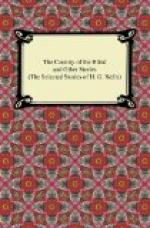I was suddenly brought back to reality by an imminent collision with the butcher-boy’s tray. I found that I was crossing the bridge over the Regent’s Park Canal, which runs parallel with that in the Zoological Gardens. The boy in blue had been looking over his shoulder at a black barge advancing slowly, towed by a gaunt white horse. In the Gardens a nurse was leading three happy little children over the bridge. The trees were bright green; the spring hopefulness was still unstained by the dusts of summer; the sky in the water was bright and clear, but broken by long waves, by quivering bands of black, as the barge drove through. The breeze was stirring; but it did not stir me as the spring breeze used to do.
Was this dulness of feeling in itself an anticipation? It was curious that I could reason and follow out a network of suggestion as clearly as ever: so, at least, it seemed to me. It was calmness rather than dulness that was coming upon me. Was there any ground for the relief in the presentiment of death? Did a man near to death begin instinctively to withdraw himself from the meshes of matter and sense, even before the cold hand was laid upon his? I felt strangely isolated—isolated without regret—from the life and existence about me. The children playing in the sun and gathering strength and experience for the business of life, the park-keeper gossiping with a nursemaid, the nursing mother, the young couple intent upon each other as they passed me, the trees by the wayside spreading new pleading leaves to the sunlight, the stir in their branches—I had been part of it all, but I had nearly done with it now.
Some way down the Broad Walk I perceived that I was tired, and that my feet were heavy. It was hot that afternoon, and I turned aside and sat down on one of the green chairs that line the way. In a minute I had dozed into a dream, and the tide of my thoughts washed up a vision of the resurrection. I was still sitting in the chair, but I thought myself actually dead, withered, tattered, dried, one eye (I saw) pecked out by birds. “Awake!” cried a voice; and incontinently the dust of the path and the mould under the grass became insurgent. I had never before thought of Regent’s Park as a cemetery, but now, through the trees, stretching as far as eye could see, I beheld a flat plain of writhing graves and heeling tombstones. There seemed to be some trouble: the rising dead appeared to stifle as they struggled upward, they bled in their struggles, the red flesh was torn away from the white bones. “Awake!” cried a voice; but I determined I would not rise to such horrors. “Awake!” They would not let me alone. “Wake up!” said an angry voice. A cockney angel! The man who sells the tickets was shaking me, demanding my penny.




